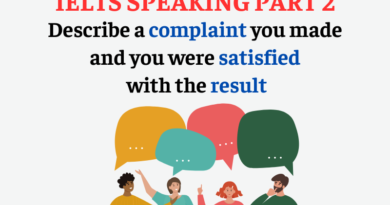IELTS Speaking Part 1: Noise
1. Do you like to stay in a place with a lot of noise?
Ideas:
- Preferences for quiet and peaceful environments.
- Impact of noise on relaxation and concentration.
- Occasions when a lively atmosphere with noise is enjoyable.
Useful expressions:
- Expressing preferences: “I generally prefer,” “I find that a quieter environment helps me,” “I tend to enjoy places that offer.”
- Impact of noise: “Noise can be distracting when,” “In noisy environments, it’s challenging to,” “I appreciate the tranquility of.”
- Enjoying lively atmospheres: “While I prefer quiet surroundings, there are times when,” “I find a certain level of noise enjoyable during,” “Lively atmospheres with noise can be enjoyable in.”
Sample answer:
I generally prefer to stay in quieter places. I find that a quieter environment helps me relax and concentrate better. Noise can be distracting when I’m trying to focus or unwind after a busy day. However, I do appreciate lively atmospheres with noise during social gatherings or events. There’s a balance, and while I value tranquility in most situations, I recognize that there are times when a bit of noise contributes to a lively and enjoyable atmosphere.
2. Do you think there is too much noise in today’s world?
Ideas:
- Technological advancements contributing to noise.
- Urbanization and population density as factors.
- Impact of noise pollution on mental well-being.
Useful expressions:
- Observing technological impact: “With the rise of technology, there seems to be,” “Technological advancements have led to an increase in,” “Modern gadgets and devices contribute to.”
- Considering urbanization: “In urban areas, the density of population and infrastructure contributes to,” “The fast-paced nature of city life often comes with,” “Urbanization has brought about an increase in.”
- Highlighting mental well-being: “Excessive noise can have a negative impact on,” “Studies have shown a correlation between high levels of noise and,” “Noise pollution has been linked to increased stress and.”
Sample answer:
Yes, I do think there is too much noise in today’s world. With the rise of technology, there seems to be an increase in noise from various sources. Modern gadgets and devices contribute to a constant buzz in our daily lives. In urban areas, the density of population and infrastructure adds to the noise levels, creating a fast-paced and often chaotic environment. Excessive noise can have a negative impact on mental well-being, and studies have shown a correlation between high levels of noise and increased stress and anxiety. Striking a balance and finding ways to reduce unnecessary noise is essential for maintaining a healthy living environment.
3. Is making noise one of people’s rights?
Ideas:
- Balancing individual rights with community well-being.
- Regulations and guidelines on noise.
- The responsibility of individuals in minimizing noise impact.
Useful expressions:
- Balancing rights: “While individuals have the right to,” “It’s essential to balance individual rights with,” “There should be a consideration for the impact of one’s right to make noise on.”
- Referring to regulations: “Many societies have regulations and guidelines regarding,” “Legal frameworks often dictate acceptable levels of,” “Authorities play a role in enforcing rules to manage.”
- Emphasizing responsibility: “While it’s a right to make noise, individuals also have a responsibility to,” “Respecting quiet hours and neighbors is part of being,” “Being mindful of the impact of one’s actions on.”
Sample answer:
While individuals have the right to express themselves and engage in various activities, it’s essential to balance individual rights with the well-being of the community. Many societies have regulations and guidelines regarding noise to ensure that people can coexist harmoniously. Legal frameworks often dictate acceptable levels of noise, especially in residential areas. Authorities play a role in enforcing rules to manage noise pollution. While it’s a right to make noise, individuals also have a responsibility to be mindful of the impact of their actions on others. Respecting quiet hours and neighbors is part of being a responsible member of the community.
4. How do you feel about noise around you?
Ideas:
- Personal reactions to different types of noise.
- Impact of noise on stress levels.
- Coping mechanisms for dealing with noise.
Useful expressions:
- Expressing feelings: “I find that certain types of noise,” “Noise can be bothersome when,” “In general, I feel more comfortable in environments with.”
- Impact on stress levels: “Excessive noise tends to increase my,” “I notice a difference in my stress levels when,” “Creating a quieter environment positively influences.”
- Coping mechanisms: “To cope with noise, I often,” “Noise-canceling headphones are helpful when,” “I make an effort to create a peaceful environment by.”
Sample answer:
I find that certain types of noise can be bothersome, especially when I’m trying to focus or relax. Excessive noise tends to increase my stress levels, and I notice a difference in my overall well-being when exposed to constant or loud sounds. To cope with noise, I often use noise-canceling headphones, particularly in busy or crowded environments. Creating a quieter environment positively influences my mood and helps me maintain a sense of calmness. Overall, I feel more comfortable in environments with lower levels of noise where I can concentrate and unwind without unnecessary distractions.


